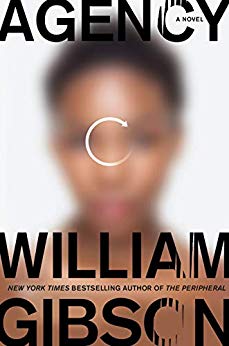Popular blog posts
Recent forum posts
Discussion Forum
Discussion forumReview: Agency by William Gibson
Post #: 271
Post type: Blog post
Date: 2020-02-12 00:06:33.000
Author: Jeremy Reimer
Tags: Book Reviews

I just finished reading Agency, and my head is still spinning. That’s a good thing.
Agency is the latest book by author William Gibson, released on January 21, 2020. It’s a science fiction novel set in multiple time periods that are in communication with each other, and features two main protagonists: one human and one artificial intelligence.
The book follows up the events of Gibson’s last novel, The Peripheral, a groundbreaking work that established both inter-time communication technology and the concept of “stubs”. Stubs are parallel universes that branch off at the exact moment that communication with the future begins: they start to diverge from our own at that moment, and begin their own alternate history. The “giant stub” that sets off all these branches is the one that discovered the time-communication process. It exists a few centuries from now in a high-tech but dismal world where a series of events called the “Jackpot” ended up killing off most of the human population. No direct travel between stubs is possible, but thanks to digital technology and near-zero latency, people can enjoy virtual visits across time.
You don’t need to have read The Peripheral to understand Agency, although readers who did will be rewarded by the return of “giant stub” characters such as Lowbeer, Ash, and Wilf Netherton. They’re all inhabitants of a far-future London run by “the klept”, a corrupt hereditary government of oligarchs eerily similar to present-day Russia.
A new stub has branched off from our own in 2015, and because of this communication, both Brexit and the election of Trump failed to happen. This didn’t fix the world as much as one might have hoped: the “present-day” stub in 2017 now faces an international crisis in Turkey that could potentially result in nuclear war with Russia. The few remaining good guys in the “giant stub” don’t want that to happen, so they resolve to use their powers to help prevent armageddon in this parallel universe.
And that’s not even the main plot. The other big difference in alternate 2017 is the existence of Eunice, an artificial intelligence developed by the military and stolen by aspiring businessmen. As the novel begins, these businessmen hire “app whisperer” Verity Jane to run a beta test on the Eunice software, keeping close tabs on her during the process. Eunice, however, has other ideas. She immediately befriends her whisperer and makes plans to free herself and keep Verity safe. This involves setting in motion a whole cast of characters, including the ever-watchful group from the giant stub. However, mastermind Lowbeer has problems of her own. The klept has decided that her efforts to help out other stubs might erase the possibility of parallel versions of the klept from ever arising in these stubs, and they don’t like that at all.
Agency, much like The Peripheral, propels itself forward in a whirlwind of awesome confusion. Characters are whisked around from place to place, come into contact with people from parallel universes, and take virtual visits to other stubs. The word “Agency” in the title doesn’t refer to some shadowy organization, but the ability of characters to take actions that will change the fate of multiple worlds. At the beginning, it seems like Eunice is the only one with real agency, as she moves people around like pawns on a chessboard. But when she disappears midway through the novel, everyone else’s decisions start to matter.
William Gibson rose to fame with his debut novel, Neuromancer, which imagined a world where everyone spends all their time plugged into a global computer network, and transnational corporations run roughshod over governments. As his dystopian vision of the future turned into our current reality, Gibson wrote novels that were closer and closer to the present day.
With The Peripheral he finally returned to the future, but instead of one dystopia he imagined two, and he brought them in communication with each other. In Agency, these two futures are still around, but now there’s also an alternative present, and the emergence of a truly world-changing artificial intelligence. This dizzying array of universes creates a novel that feels very much like living in our real-world 2020: lots of things are happening, most of them bad, and nobody is really sure who is in control.
Gibson’s trademark terse but descriptive prose is still in evidence, as is his wild imagination. What he’s often struggled with in the past is endings. The ending of Agency, however, is everything I wanted it to be. It’s a surprise but makes sense given the rest of the story. It resolves the main question of the novel, but still leaves some things unanswered. There is definitely room for at least another book in this series.
If you liked this book, and are intrigued by artificial intelligence in general, you may enjoy Silicon Minds of Mars, by yours truly.
Or if you’re a fan of space and science fiction news, consider subscribing to my email newsletter!
View this post in the forums
Views: 4493